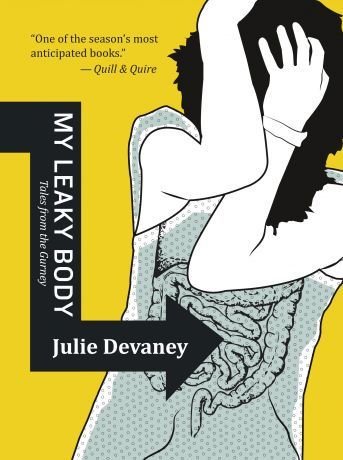Arts
You are here
It takes guts to write a book like this

February 3, 2013
I loved this book. This is Julie's story of her discovery of her chronic disease and the ensuing battles with her body and the usually impersonal and frequently unsympathetic medical profession. The inhumanness of our medial institutions and their practitioners led Julie to fantasize about presenting at academic conferences: “I want to read from my chart, sitting on an academic table covered with a real hospital sheet and wearing my very own gown.” From this image she developed her very successful play, My Leaky Body, and now this book.
But it is much more than a disease memoir or a book of self discovery and healing: she uses her visceral stories to make important political points.
The way she tells the story of her chronic bowel disease makes a very compelling narrative that is hard to put down; at the same time her depictions of the pain and doubt in her self make it hard to read. And yet, it is frequently laugh-out-loud funny.
The book starts with Julie's adventures as an activist, a grad student, and recent arrival to Vancouver. She quickly discovers that none of those are very forgiving to someone who has less than perfect health. In her repeated visits to hospital emergency wards she soon discovers that they aren't very accepting of chronic disease either.
This is where much of the power of the book comes into play. The combination of the first person narrative and the evocative story telling puts the reader into Julie's hospital gown to feel what it is like to suffer the (mis)treatment she is subjected to. Rapidly it becomes clear that our world and its institutions discourage humane treatment of one another. The doctors frequently treat Julie as a case to be treated; her opinions, pain and emotions rarely enter into their deliberations. Her supervisor and the chair of the department at grad school only believe that she is a trouble maker who chooses not to complete her work. Through her experience we see that our society does not treat us as humans; our abilities and strengths are not only different from each other but each person also changes over time. At work, at school, we are expected to be interchangeable with each other, but also the same from day to day, no matter the state of our physical or emotional health.
Early in the book is a great depiction of socialism and condemnation of capitalism. In discussing the disconnect between our formal democracy and “the way power operates in our daily lives,” Julie writes: ”why is it that we need to defer to the medical authority of doctors in order to be treated well? Surely, we would all prefer to enter the scenario as equals, where we can freely discuss possibilities and options, where someone else's education and practical experience are simply a resource in collaborative decision making – not a license to dictate. … When did the value of a professional opinion become directly opposed to respecting the deep wisdom and knowledge that we all carry in our own bodies?”
Let's build a world where all our institutions celebrate our humanity, not try to eliminate it.
Find out when My Leaky Body is coming to a conference or theatre near you: www.myleakybody.com
Section:









